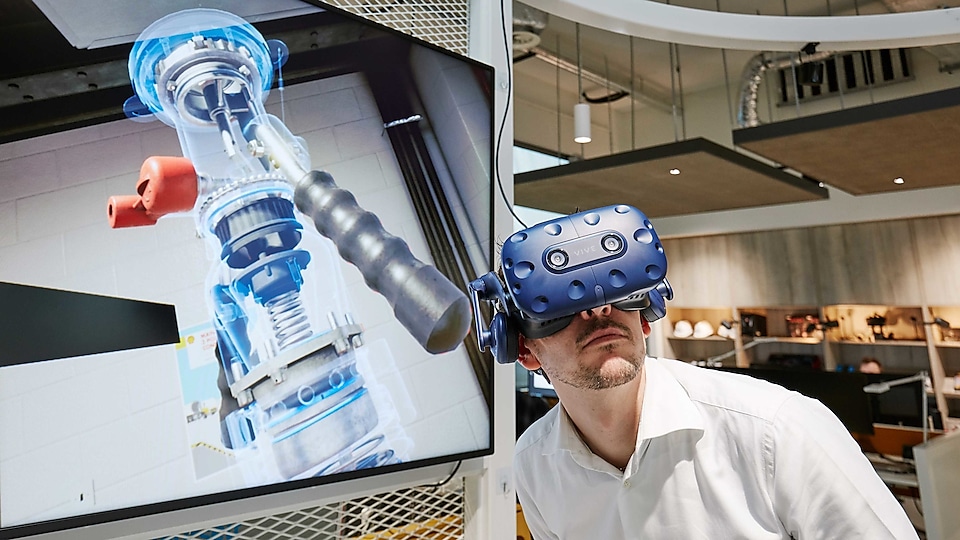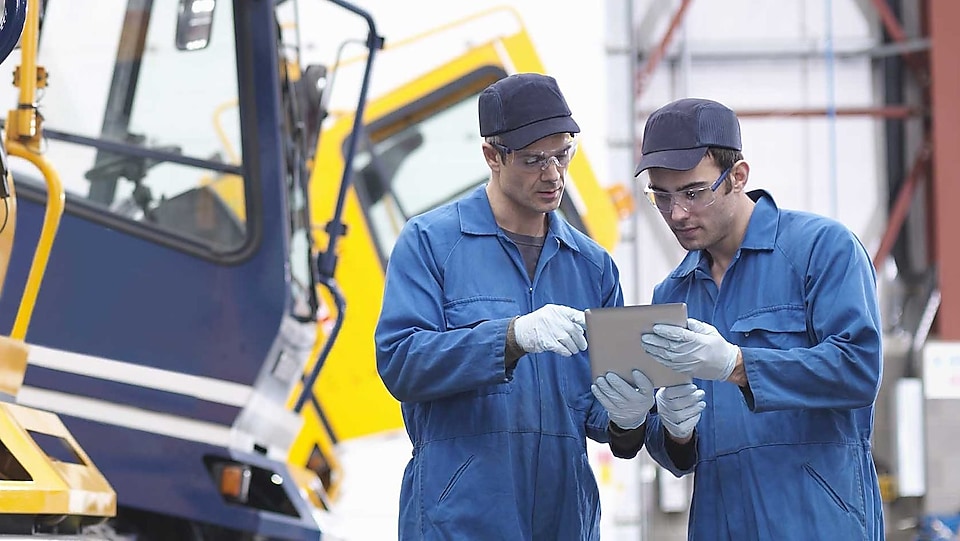
Digital Technology - the Disruption the Construction Industry Needs
Digitalisation and construction may not be two words that are always used together. Find out from a construction specialist how digital solutions can help companies overcome their key business challenges
By Shell Commercial Fuels in collaboration with Fred Mills, Co-Founder and Director of The B1M Complete on Mar 09, 2020
“The dear, old construction industry has remained the same for a long time now and it’s becoming increasingly untenable for it to stay as it is.” When Fred Mills co-founded what is now the world’s most subscribed-to video channel for construction, The B1M, his key aim was to help bring the industry more in line with the disruptive business models around it, both in perception and performance.
The challenge he faced was how to enact such substantial changes in an industry that has traditionally been relatively insular and slow moving. Over the last 20 years, global construction has grown by only 1% compared to 3.6% in the manufacturing industry.1 In light of legislative changes, growing environmental concerns and shifting energy supplies, Mills felt the traditional construction model was increasingly unsustainable. His response? “I saw digital technologies as a way of changing the industry for the better.”
Challenges Facing Construction Companies
Digital technology in the construction industry is not a new conversation, though it remains one that many don’t know how to best approach. However, with the business world changing, margins ever tighter and operational demands rising, a digital disruption is increasingly necessary to help companies overcome their key business challenges.
So, what are these challenges? A recent global study by Shell Commercial Fuels found that the three most pressing issues construction companies face are: increasing efficiency (47%); maintaining profitability as operational costs increase (37%); and differentiating in a competitive market (37%).2 Unsurprisingly, in an environment of such narrow margins, the common thread between these is financial.
It All Starts with Fuel Choice
Digging a little deeper still, the study uncovered that on average, 20% of operating costs are attributed to fuel.3 This realisation opens up a fundamental opportunity to optimise the essentials – on-site, process, and production efficiency – by choosing a high-performing fuel and pairing it with the correct digital technologies that can help maximise equipment performance.
“If people start using more high-performance fuels or increase their fuel efficiency, that’s a way to enhance productivity and improve margins immediately.”
Fred Mills
Mills agrees: “If people start using more high-performance fuels or increase their fuel efficiency, that’s a way to enhance productivity and improve margins immediately.” But, the real benefits arise when fuel choice and digital technology are considered together.

How Digital Technology Can Boost On-Site Efficiency
Though the combination of digital technologies and fuel considerations is often overlooked, it raises two key drivers of efficiency: internal (the performance of equipment as a result of the consumables within them) and external (the broader processes that govern sites). While there are many technologies lying on the horizon, several existing features can have a beneficial impact on business today.
Artificial Intelligence & Machine Learning
As the amount of data available to companies increases, so do the capabilities of artificial intelligence (AI). As Mills states: “AI is beginning to play a bigger role in how the industry operates day to day, on the ground – from machinery performance, to site management and how staff are monitored.” While harnessing Big Data can seem daunting, AI’s potential to aggregate and process it can unlock huge efficiencies in on-site tasks, such as inventory monitoring and scheduling. This continuous machine learning can have a direct impact on fuel optimisation, by monitoring and predicting fuel needs – something that 69% of companies would find helpful.4 This, in turn, guards against over-purchasing (spending unnecessary funds), over-stocking and the associated risk of fuel ageing.
Connectivity & Automation
Digital connectivity and automated technologies have the ability to optimise the usage of consumables and materials, including fuel, through a range of means – reducing idle time, route optimisation, improving asset productivity (output per hour) – and thus maximising overall site or project efficiency. In construction, this generally takes the form of robotics, autonomous vehicles and the Internet of Things (IoT), but soon it could even expand to completely connected job sites through a proliferation of sensors and smart devices. “There’s definitely potential for the IoT to take a larger role on construction sites, where different aspects of the site can be communicated into a central dashboard and AI can literally inform how site management can be improved,” Mills suggests.
For example, digital start-up MachineMax has launched a new telematics platform that combines AI and connectivity to tackle the multibillion pound industry issue of off-highway fleet underutilisation. The solution creates a unique machine signature to live-track vehicle usage, idling and performance, before employing cloud computing to present real-time data and analysis to site operators. This not only reduces total cost of ownership (TCO) but also boosts site productivity.
Digital start-up MachineMax has launched a new telematics platform that combines AI and connectivity to tackle the multibillion pound industry issue of off-highway fleet underutilisation.

Virtual & Augmented Reality
Perhaps the most exciting digital advancements in construction come from the emergence of virtual reality (VR) and augmented reality (AR) technologies. One key example of this is digital twinning, which allows users to access a virtual replica of a physical site or building in real-time, as a result of connected sensors and datasets.
This has huge implications for on-site efficiency and the optimisation of resources, including energy and its associated emission reduction. According to the Lean Construction Institute, approximately 70% of the activities performed in the design and construction industry are classified as ‘non-value add’ or waste.5 Now, imagine if a site manager could prepare for construction by experiencing the site virtually, before executing any on-site output. “It’s not only great from an ‘understanding data’ perspective,” Mills explains, “but also in terms of engaging people in a compelling way about how their built environment is operating.”
Approximately 70% of the activities performed in the design and construction industry are classified as ‘non-value add’ or waste.
Equipping Your Staff and Building for the Future
The final piece of the puzzle when striving to make digitisation the ‘new normal’, is to ensure staff are properly equipped and on board with the technology advancements available to them. Indeed, 37% of companies stress that training employees in the use of new vehicle and engine technologies will be a key challenge to their business over the coming years.6 Combating this requires a consistent talent management strategy that can help to attract digital experts to work for the construction industry. Equally important is equipping existing staff with the knowledge and insights required for using digital technology to unlock tangible efficiencies. These will benefit daily tasks and bring real TCO improvements to high-expenditure areas such as fuel.
Partnering with energy experts like Shell Commercial Fuels can help companies integrate best practices, which, when combined with high-quality fuels such as Shell FuelSave Diesel, can unlock significant cost savings across the whole – starting today. “I think collaboration is really important,” Mills says, “we have to draw a path for people and help them understand what steps can be taken today, of which fuel efficiency is definitely one.”
Just as Rome wasn’t built in a day, neither will the construction industry become fully digitised overnight. However, brick by brick, progress is gradually being made. Digitisation is the disruption the industry needs to help reduce TCO, improve efficiency, and fully transition global construction into the 21st century. “What excites me most,” says Mills, “is that the industry is now going to change.”
Fred Mills’ Top 3 Tips for Approaching Digital Technology in Construction
1. Focus on what these tools and techniques can do for your business – Ask yourself ‘how can we do this better through digital technology?’ Resist the urge to simply ‘tick the box’ and instead, bring it back to the business case and decide what is a sensible investment.
2. Compel people, don’t tell people – You need to help people on the ground to understand the benefits these technologies can have on their working lives and on the processes they’re engaged in. Better understanding the operations of your built environment can be very powerful.
3. Don’t be afraid to fail, but fail fast and move on – The traditional construction culture of a reluctance or fear to fail is totally at odds with the way technology companies work. Take a lesson from them and learn to thrive on making mistakes and continuously improving.
Footnotes
1 McKinsey Global Institute, ‘Reinventing Construction: A Route To Higher Productivity’, 2017.
2 Shell Commercial Fuels, Thought Leadership Construction Sector Global Report, 2018.
3 Shell Commercial Fuels, Thought Leadership Construction Sector Global Report, 2018.
4 Shell Commercial Fuels, Thought Leadership Construction Sector Global Report, 2018.
5 Lean Construction Institute, ‘Learning to See Waste’.
6 Shell Commercial Fuels, Thought Leadership Construction Sector Global Report, 2018.





